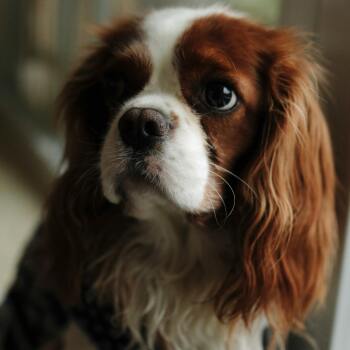Cavalier King Charles Spaniels

A Royal Companion With a Heart of Gold
If you’re seeking a small dog with a big heart, silky-soft fur, and soulful eyes, look no further than the Cavalier King Charles Spaniel. Known for their affectionate nature and gentle spirit, Cavaliers are ideal family pets—and total lap lovers.
Why Cavaliers Win Hearts
- Full of Love: These pups were born to cuddle and thrive on human affection.
- Playful Spirits: Cavaliers have a youthful energy and are always up for playtime with kids or adults.
- Social Butterflies: They get along famously with children, other dogs, and even cats.
- Eager to Please: Quick learners with a soft personality, they respond well to positive reinforcement.
- Smart and Adaptable: Intelligent, charming, and easy to train—they’ll make themselves at home wherever you are.
What to Know Before Bringing One Home
- Velcro Dogs: Cavaliers don’t like being alone for long stretches and can develop separation anxiety.
- Small But Mighty Hunters: That adorable chase instinct? It’s real—especially with squirrels and small pets.
- Housebreaking Takes Patience: Consistency is key when it comes to potty training.
- Not Built for Heat: These are indoor dogs who prefer A/C over high temps.
A Regal History
Once cherished companions of British royalty, Cavaliers were bred to be affectionate lap dogs with a playful edge. Their name reflects their noble lineage—King Charles II was rarely seen without a few of these dogs at his feet!
Health & Lifespan
With proper care, Cavaliers typically live between 9–14 years. But like all breeds, they come with their own list of health risks—many of which can be managed with regular vet care and early detection.
Health Concerns in Cavalier King Charles Spaniels
- Mitral Valve Disease (MVD)— The #1 health concern for Cavaliers. This heart condition causes the valves to weaken over time and can lead to heart failure if left untreated. Annual vet checkups are essential—especially in senior dogs. Weight control, fatty acid supplements, and medication can improve longevity and quality of life.
- Neurologic Issues & Seizures— Seizures, tremors, excessive sleepiness, or unsteadiness may signal a neurological problem. Cavaliers are also prone to idiopathic epilepsy, which may require lifelong medication. During a seizure, keep your pet safe but avoid their mouth, and call your vet immediately.
-
Partial Seizures— Can look like air snapping or "zoning out"—keep a log and notify your vet.
-
Syringomyelia (SM)— A painful spinal cord condition common in Cavaliers. Symptoms include head rubbing, sensitivity around the neck, or yelping unexpectedly.
-
-
Bone & Joint Conditions
-
Patellar Luxation— A slipped kneecap can cause limping or skipping while walking.
-
Hip/Elbow Dysplasia— May cause arthritis and joint pain. Keeping your pup at a healthy weight is crucial.
-
Intervertebral Disc Disease (IVDD)— A painful spinal condition that can lead to paralysis. Prevent injury with ramps and controlled exercise.
-
-
Eye Conditions
-
Cataracts & Glaucoma— Can lead to blindness if untreated—especially in senior dogs.
-
Progressive Retinal Atrophy (PRA)— A hereditary condition that causes slow vision loss.
-
Dry Eye (KCS)— Painful and itchy without treatment; managed with daily eye drops.
-
Ichthyosis— Not just flaky skin—this genetic condition leads to severe scaling. It’s manageable with medicated shampoos and supplements.
-
- Bladder & Kidney Stones
- Charlies are prone to urinary crystals and stones. If you notice straining, bloody urine, or frequent accidents, call us immediately. Regular urine tests and diet changes help prevent flare-ups.
- Charlies are prone to urinary crystals and stones. If you notice straining, bloody urine, or frequent accidents, call us immediately. Regular urine tests and diet changes help prevent flare-ups.
- Hemophilia & Bleeding Disorders
- Before any surgery, your vet may recommend clotting tests—Cavaliers are predisposed to blood disorders like hemophilia.
- Before any surgery, your vet may recommend clotting tests—Cavaliers are predisposed to blood disorders like hemophilia.
- Allergies & Atopy
- Itchy paws, recurring ear infections, or red belly? Your Cavalier may have allergies. These typically appear between ages 1–3 and can be managed with allergy meds, special diets, and regular cleaning.
- Itchy paws, recurring ear infections, or red belly? Your Cavalier may have allergies. These typically appear between ages 1–3 and can be managed with allergy meds, special diets, and regular cleaning.
- Ear Infections & Hearing Loss
- Cavaliers’ floppy ears can trap moisture and wax. Routine cleaning prevents infections that could lead to permanent hearing damage. Some dogs may also experience congenital deafness—if you suspect hearing loss, we’ll help you test and manage it.
- Cavaliers’ floppy ears can trap moisture and wax. Routine cleaning prevents infections that could lead to permanent hearing damage. Some dogs may also experience congenital deafness—if you suspect hearing loss, we’ll help you test and manage it.
The Cavalier Code: Loyal, Gentle, and Joyful
With the temperament of a lap dog and the energy of a puppy-at-heart, Cavaliers make delightful companions for families, seniors, or first-time pet owners. All they ask for is your love—and they’ll return it a hundred times over.
Ready to Learn More? We’re Here to Help!


